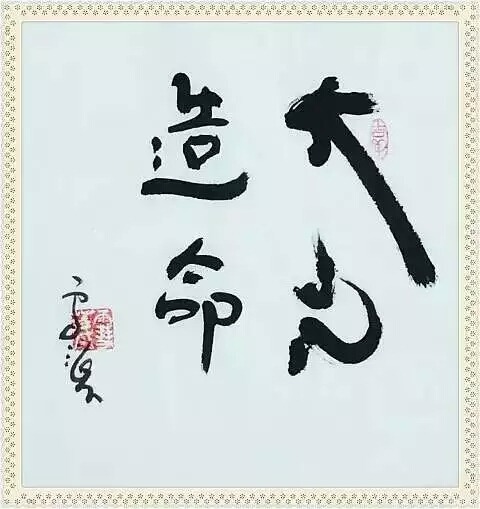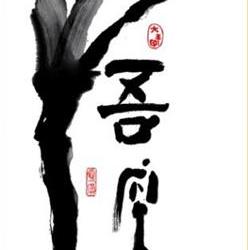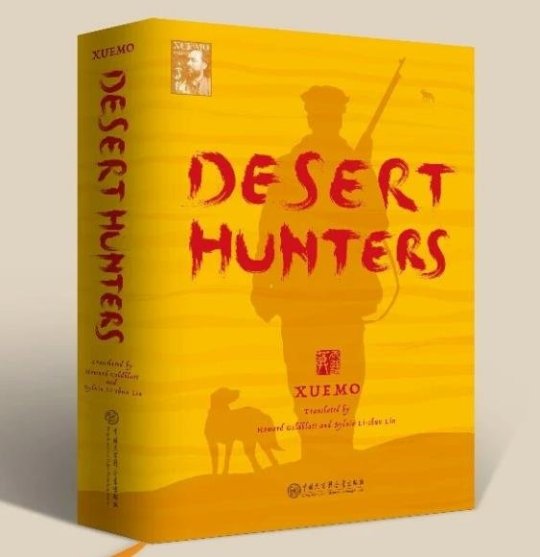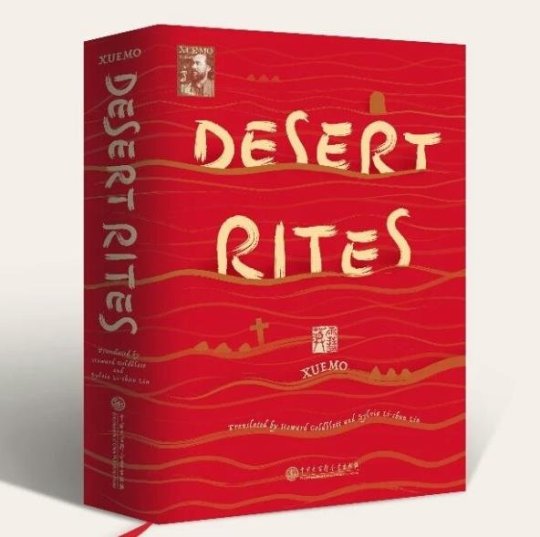Video
youtube
雪漠问答1:人际交往 Xue Mo's Wisdom Answers Episode 1:Interpersonal
怎样才能与各种各样的人和谐相处?How you can get along well with all kinds of people?
Xue Mo,one of China's top-ranking authors and a famous cultural scholar,Vice-chairman of Gansu Writers Association,Dean of Guangzhou Research Institute for Shangpa Culture.
雪漠,作家、文化学者,甘肃省作家协会副主席,广州市香巴文化研究院院长。 著有长篇小说《凉州词》《野狐岭》《大漠祭》《猎原》《白虎关》《西夏咒》《西夏的苍狼》《无死的金刚心》;
诗集《拜月的狐儿:雪漠的情诗或道歌》;
自传《一个人的西部》;
文化系列:《光明大手印:实修顿入》《光明大手印:实修心髓》《真心》《文心》《慧心》《空空之外》《老子的心事:雪煮道德经》《佛陀的智慧:雪证金刚经》《大师的秘密:雪漠解读古印度八十四大成就者》等;
游记系列:《匈奴的子孙》《堂吉诃德在北美》。
4 notes
·
View notes
Video
youtube
How you can get along well with all kinds of people? (如何與他人相處?)
Xue Mo's Wisdom Answers 01
1 note
·
View note
Photo

我為什麼開創意寫作班呢?因為,我既想讓大家明白真心狀態,也希望大家的智慧能活起來。如果你能認知真心,並且妙用真心,你的心中就會充滿無窮的詩意和生機,當你讓它們流出來,讓它們化為文字的時候,你就是在妙用智慧。
1 note
·
View note
Photo

#雪漠:#我的成功學
《老子的心事:雪煮道德經》
我有個朋友,生意做得很大,我問他,你成功的秘訣是啥?他說,他永遠讓別人佔便宜,所有跟他合作的人都很開心,都願意繼續跟他合作,他就有了無窮的機會。生意當然越做越大。
他的理論跟我的理論很像,我也老是告訴學生們,要讓別人賺錢。當整個社會都在爭名奪利的時候,你成全別人,幫助別人,你必然會成功。你想想,跟你合作的人都會成功,你怎麼能不成功呢?
這就是我的成功學。只要心裡不貪,行為上也不去索取什麼,永遠是能幫別人就多幫幫別人,能做些事情就儘量多做些事情,永遠不去搶,那麼你自然就會成功。
1 note
·
View note
Photo

觉悟是超越一切外相的,看起来一本正经,不代表证得了光明心。真正重要的,是那颗心,是心灵的觉悟和人格的伟大,而不是外相,也不是神异。
1 note
·
View note
Text
Being alive is always better than being dead,because only when you are alive can you remedy the many regrets of this lifetime,and correct the many mistakes in your life.But the prerequsite for everything is that you must have a mind and spirit that are strong and filled with wisdom.
The World Is a Reflection of the Mind
XUE MO
Translated by J.C.Cleary
1 note
·
View note
Text
The Transmission of the Light
The Holy Monk and the Spirit Woman(无死的金刚心)【SERIAL】
XUEMO's work,
translated by J. C. Cleary
After passing on information for many years, the old man [Khyungpo Naljor] had handed on to me all the wisdom and the light of his realization. This kind of story always appears in the tales of the warrior-heroes. All the great heroes, at the moment of danger, can take their entire wealth of inner strength, and pass it along to their disciples. This of course is a narrative device for such stories. But in yoga, such stories of transmission really happen. This is very similar to the transmission of a certain program between two computers online.
This is the power of being in accord.
If there is no accord, then there is no yoga. The real meaning of yoga is being in accord. Being in accord with an advanced teacher is the key for all the esoteric teachings.
Here I will use an example that you can take in. You can consider the wise teacher as a computer equipped with many programs of wisdom. I am like a computer on another network. My faith in him and my karmic links with him are data lines. As long as these three things are fully prepared, then it is possible to guarantee that the “data” of wisdom will be transmitted between us. Although outsiders will never be able to put together these high-level programs, after going through a long training process, they may be able be able to use them. Similarly, though the author’s wisdom is simple and crude, because there has been this process of transmission after being in accord, I am able for this reason to have the wisdom and ability offered by these “programs.”
In the yoga system of the Great Mudra, this is called “the Great Mudra of Light.” It is only because I have obtained these “programs” of wisdom written by these great teachers over the ages, that my life has realized an upward course. It is only because this experience, this light, was transmitted, that my writings are called the system of “the Great Mudra of Light.”
In fact, later on, it was already very hard for me to distinguish myself from this old man [Khyungpo]. It was also very hard for me to distinguish us from the fundamental Five Great Diamonds [of Vajrayana] that he and I practiced. In yoga, they often use one expression to describe this: “without duality, without difference.”
Later on, at the Ta’er Temple in Qinghai, I invited a virtuous teacher to attest to the fact that I merged with the experiential realm of clear light to write. He said: At this time, there is no duality and no difference between you and the Fundamental Buddha’s Five Great Diamonds.
The German philosopher Martin Buber in I and Thou wrote of this kind of accord:
The world of It is set in the context of space and time.
The world of Thou is not set in the context of either of these.
The particular Thou, after the relational event has run its course, is bound to become an It.
The particular It, by entering the relational event, may become a Thou.
Martin Buber, I and Thou, translated by Ronald Gregor Smith (New York: Charles Scribner’s Sons, 1958), p. 33.
This is another explanation of “without duality, without difference.”
Besides this, you also can read the very detailed explanations of “without duality, without difference” which I give in my books The Great Mudra of Light: the Heart of Real Practice and The Great Mudra of Light: Real Practice, Sudden Entry.
Therefore, you can understand this book in four ways:
1. It is a kind of record of a completed interview from when I and “he” had not yet reached the stage “without duality and without difference.”
2. It is in fact my own esoteric spiritual journey.
3. You can still take it as the words of a novelist, a different kind of spiritual novel.
4. You can also take it as a kind of symbol.
·to be continued...·
1 note
·
View note
Photo

#Pilgrimage
Thus I say that any people who pursue what is lofty and sublime are always on a pilgrimage their whole lives,if we look into the real substance of it.Sometimes they study a certain kind of spirit.Sometimes they go toward a certain kind of conduct.Sometimes they read a good book.No matter what form it takes,as long as the person's action can elevate the person's life,we can call this going on a pilgrimage.
"The Holy Monk and the Spirit Woman"
Xue Mo
Translated by J.C.Cleary
2 notes
·
View notes
Text
If you establish happiness on something that is formed by the coming together of causal conditions,this implies that your happiness will be conditional. Once that thing your happiness depends on dissolves away with the scattering of those causes and conditions,your happiness too will dissolve away.Happiness that is based on external things will not last,no matter what the external things are.
The World Is a Reflecion of the Mind
Xue Mo
Translated by J.C.Cleary
1 note
·
View note
Text
Therefore, you can understand this book in four ways:
1. It is a kind of record of a completed interview from when I and “he” had not yet reached the stage “without duality and without difference.”
2. It is in fact my own esoteric spiritual journey.
3. You can still take it as the words of a novelist, a different kind of spiritual novel.
4. You can also take it as a kind of symbol.
1 note
·
View note
Text
The Firelight of the Death-Dealing Mandala
The Firelight of the Death-Dealing Mandala
You must realize that there are infinite occult powers in the universe, divided into different frequencies and wavelengths, which can produce different functional powers. When you use a special form to mobilize these occult powers, you can achieve your aim, whether it is to end disasters, or to increase them, whether it is to reconcile, or to slay.
These four – methods of increasing, methods of stopping, methods of reconciling, methods of slaying – are the four fundamental abilities sought by many of those who cultivate yoga.
I got up and left the house. The moon in the sky was bright, and the dark mountains cast their jagged shadows. The wind was blowing and swept across my face, refreshing and cool.
Looking toward the distant mountains, I thought of a dream I had had when I was little. I almost suspect that this was not a dream. In ordinary dreams you cannot make out colors, because when you are asleep the part of our brains that controls colors is in a state of restful sleep. What I went into was a scene full of light. In the dream, I was invited into a holy place by five girls. There was a woman there who was very familiar, as if we had known each other for a long time. The woman took a book, a book with a vivid red cover, with Sanskrit written on it. At that time, I still could not recognize Sanskrit. In the book there was a group of men. Absentmindedly, I heard someone introduce them by saying, these are the Five Great Vajras.
Though my somnolent mind was filled with wonder, I did not ask any questions, because every time I started to think of one, I could hear a voice giving an explanation. This voice did not come from any throat, but came from the spirit of my inherent mind. It told me this was my past life. I was not clear whether this voice was saying “past life” or “mission in life” – in my eyes, these two expressions are both the same.
The woman smiled warmly and took this book and put it into my breast. I remember immediately feeling a great joy filling the heavens.
That woman told me her name was Niguma.
I clearly remember her face: she was bright as the moon; she had a light and graceful presence like a pure breeze; she was precious as a beautiful flow; she radiated a warmth like the sun in springtime. That face made a deep imprint on my life. In inadvertent moments, I can often see her.
Niguma, my Niguma!
I still remember this dream. I did not tell anyone about it. I thought to myself: in this lifetime, I must surely find this woman. I thought that maybe she was my mother in a previous lifetime.
I had this dream when I was eight years old. At that time, I had already begun to lecture on the Bonpo scriptures, and I had become known near and far as a spiritual child prodigy. Every time I finished lecturing on a scripture, people would all give me many offerings. This was the norm. But I was not interested in the things that were so fine in the eyes of the ordinary lay people. I kept remembering that dream. Sometimes Niguma would still appear in my dreams. She was always looking at me from far away, and she was still smiling warmly like that. I was always able to sense compassionate waves emanating from Niguma’s body. I very much wanted to get close to her, but she was always so far away from me.
At that time, I thought that maybe if I thought about something by day, then I would dream about it at night.
But one night a month later, Niguma again appeared in a dream. This time she came close. I could see that there was an eye on her forehead. That eye emitted a gentle light, like moonlight, which could shine into my mind. I remember the woman saying, “I have waited for you a long time – why haven’t you come?” This voice did not come from the throat, but from the spirit of inherent mind.
I thought, she is surely my mother from a past life. I gazed at the moonlight, and felt that the moonlight itself had become that woman. I thought: no matter what happens, I must go find her.
At that time, I certainly did not know that in a remote mountain valley, a fire mandala intended to kill me was blazing up. A bunch of Bonpo guardian spirits with their discriminating minds were beginning to extend their fangs and claws toward me.
1 note
·
View note
Text
The Secret Transmission of Khyungpo
The Holy Monk and the Spirit Woman(无死的金刚心)【SERIAL】
XUEMO's work,
translated by J. C. Cleary
The Secret Transmission of Khyungpo has existed all along by means of a certain mystical method, which people call “secret treasure.”
The secret treasures include treasures in the form of texts, treasures in the form of sacred objects, and treasures in the form of teachings. Treasures in the form of texts means the texts of the sutras. Treasures in the form of sacred objects means vessels of the teaching, relics of eminent monks and teachers of great virtue, and so on. The relics of [the Tantric dakini] Vajravārāhī discovered by the author are a classic treasure in the form of a sacred object. In different forms, these secret treasures are preserved in the forms of the five elements – earth, water, fire, air, and space.
The most miraculous among the secret treasures are treasures in the form of consciousness. Treasures in the form of consciousness are one kind of treasures in the form of teachings. When circumstances were not favorable and there was no way to transmit them widely, certain kinds of mantras and teaching methods and other cultural materials were hidden by the buddhas and bodhisattvas or spirits, hidden deep within the consciousness of certain people, so that the transmission of them would not be lost. Then, when the circumstances were ripe, under the impetus of a certain kind of spiritual power, they flow forth again from the minds of those who hold these treasures of consciousness.
The Secret Transmission of Khyungpo thus belongs to the category of treasures in the form of consciousness. It takes the spiritual quest of Khyungpo Naljor and preserves it in a certain mysterious place. At a certain moment in time many years ago, I encountered it.
In that instant, I suddenly thought of Khyungpo Naljor. I very much wanted to know his path to experiencing enlightenment. When we speak of those people who are seek freedom, what is more meaningful is in fact not the outcome, but rather the process of overcoming the self and reaching the Other Shore of freedom. I very much wanted to know what kind of life and process of practice Khyungpo Naljor, who had been an ordinary man, had gone through so that he became a sage.
At this point, I relied on a realm of experience that goes beyond nature, that goes beyond the distinctions of time and space, and I reached the place I wanted to reach. At that time, I had undergone many years of cultivating the Great Mudra of Light, and I had already broken through the barriers, and my discriminating mind had begun to merge with the realm of light. In that kind of boundless clear light, I began to pray and observe. Soon I saw a point of light – it was like a firefly fluttering around on a dark night. At the beginning, it moved back and forth, seeming to be there for an instant, and then seeming to be gone. Later it came to rest, and it was like a star in the night sky, fixed in one spot. At that point I was observing it in the midst of clear emptiness. Before long, the point of light changed into the light of a candle. At first, the candlelight was swaying, but gradually the brightness opened up, and finally the light radiated out in all directions. At this point, I saw a candlestick, and I also saw a hand lifting the candlestick. Following along from the hand to the arm, I saw the whole body of the person holding up the candlestick. An old man with a penetrating vision was looking right at me. He was very lean. He told me that he was Khyungpo Naljor. I felt this was strange, because the Khyungpo Naljor depicted in the tanka paintings was a fat lama. But he told me that the real Khyungpo Naljor was a gaunt old man. He told me that the form I was seeing was how he looked as a one-hundred-forty-eight-year-old man.
So in this manner, in this realm of light, we managed to communicate. I inquired about his past, I heard his story, I asked him everything about himself. Many years later, when I mentioned this story to a disciple of the tenth Panchen Lama, he laughed mysteriously. He said I should not take this as a dream.
One day that old man set out a book before my eyes – this was the Secret Transmission of Khyungpo. The pages of this book seemed to have already yellowed with age. He opened it to the first page. I earnestly read it. Every night I could read through several dozen pages. The days passed, and I read through this book and finished it. A person who had experienced enlightenment told me that this book was written using dakini characters. In this respect, it is very similar to Milarepa’s Songs of Enlightenment. The story goes that the book we are familiar with as the Milarepa’s Songs of Enlightenment was passed on by an adept from the dakini characters.
Over time I came to understand clearly all the content set forth in this book. Later on I came to thoroughly understand all the esoteric meanings that lay behind the text in this book.
Still later, the frost of dualism truly melted away in the light of wisdom, and all the barriers between me and the old man were gone. From this time on, I no longer had to use this text, and I could communicate with this wise old man.
As they say in the practice of yoga, I was in accord with this old man.
This “being in accord” is a very meaningful phrase. It is a little like people transmitting data over the internet. He presses “send” and I press “receive” and the transmission of the message begins from this.
What is transmitted between that old man and me, besides the contents of this book, also includes something called “experiencing the light.”
Thus, at a certain point, my vessel of wisdom was filled up, and this book was born by it pouring out.
This then is the origin of the present book.
Professor Chen Xiaoming of Beijing University has called this kind of writing “comprehending past lives.”
He said:
Xue Mo’s works are obviously not the same. … It’s like tasting a story in a dream that completely disarranges the present logic, and goes beyond the boundaries of the present space and time at will. What is called “comprehending past lives” means comprehending the outcome of one’s whole fate – that is, everything is within the calculation of fate. It is something that can see through fate, and has a serene spirit. The narrator himself is a spirit within the programming of the calculations of fate. He is a ghostly auxiliary who can calculate fate. He loves this movement of fate, he stays close to this movement of fate – this is comprehending past lives.
The Professor also said:
Xue Mo uses his sincerity for religion, and his experiences come near to the extreme limits of life. Thus there is a sort of intoxication of the spirit in the body, a kind of madness in the manner of Dionysius, the god of wine. This kind of work also is like a kind of spell, a kind of final mantra. Only by using this spell-like writing can he give forth his own inner life experience – experience facing death. … The meaning of comprehending past lives lies in this: only such extreme writing can reveal the basic substance of contemporary writing.
(from Chen Xiaoming, How Can Literature Be Free: From Culture to Religion; from the lecture on Xue Mo’s Spells of the Western Xia)
When I saw the passages above, I exclaimed: Professor Chen has good insight!
In the time when critics have been alienated, [someone like] Professor Chen Xiaoming is really very hard to find. Mr. Chen, being full of so many contemporary terms and influences, has still not been cut off by the times from his spiritual wisdom.
This is right. In reality I have gone through a kind of supernatural writing process. I have experienced “that kind of pure Dharma bliss that never for a moment leaves me.” I have merged into “that realm that is bright and empty as the sky, pure as the ocean, without waves or ripples, without clouds, like a dream or an illusion, a mind without obstructions.” “When I write there are no words in my mind, it is bright and empty as the sky, empty and spiritual to the limit, yet I am able to let all sorts of writings flow out from within inherent nature.” (from The Great Mudra of Light: the Heart of Real Practice)
But I do not cling to this, because according to the standards of what is called “the Supreme Truth,” everything in this world is an illusion. That is to say, the basic substance of all things and appearances is in reality all illusory transformation. It is like something in a memory.
In all the activities of humankind, except for memories, we cannot find any real substance that does not change. Yet those memories dissolve away, like yellow dogs running away in a dust storm – it is very hard for us to catch them. However, because the present book appears, those many historical memories will certainly become just the opposite, and last forever. This is the meaning of Xue Mo being alive.
·to be continued...·
1 note
·
View note
Photo

(via 雪漠:武魂与疼痛——《凉州词》创作谈(下) - 真正的武魂,从来也不张牙舞爪,它更像是“不战而屈人之兵”,它既有菩萨低眉垂首的平和与慈悲,也有金刚怒目的威慑和强力。而它始终有武德作为精神的支撑,武是为了止戈,金刚怒目是为了慈眉善目。 )
1 note
·
View note
Photo

(via 雪漠:武魂与疼痛——《凉州词》创作谈(上) - 有武侠梦想的人,未必知道真正的武侠生活。所以当有人问我,《凉州词》是武侠小说吗? )
1 note
·
View note
Photo

Desert Hunters
By Xue Mo,Translated by Howard Goldblatt and Sylvia Li-chun Lin.
Desert Hunters is the second novel of Xue Mo' s desert trilogy, in which he extends his detailed and precise observation from the outer life situation of common people in Western China to the world of their soul.
The novel begins with an incident of poaching, and all the plots unfold around a precious well named Pig Belly Well because the water in it is the most important source to the survival of all the living around it, especially for the herders and their sheep. Therefore, where there is sufficient water, there is peace, or there won’t be. In fact, when the water level drops below one hundred meter, there is a series of bloody fighting taking place immediately, which is exactly like human’s self-destruction originated from the greedy desire.
Meanwhile, the writer attaches great importance on dealing with the fierce battles between environmental protectors and poachers, thus expressing his concern and introspection over the mass killing of animals by human, the serious human damage to nature, and the increasingly severe land desertification in China’s western regions.
In 2018, the well-known translator Howard Goldblatt translated the novel into English with his wife Sylvia Li-chun Lin.
1 note
·
View note
Photo

Desert Rites, Xue Mo’s first novel, is one of his desert trilogies that takes him twelve years to finish with elaborate care and finally makes him achieve immense literary acclaim and launches his career as a nationally recognized writer.
The novel, which is set in the Hexi Corridor of Gansu Province, is remarkable not only for its huge cast of characters and psychological scope, but also for its precise and detailed episodic records of the famers’ life in China’s west typical of the middle and the end of 20th-century Chinese society.
It vividly portrays the everyday life of peasant Lao shun’s family who struggles to survive when there is extremely short of material support, and shows their brave resistanceagainst their miserable fate and the unremitting pursuit for a better life, which mirrors the farmers’ harsh living conditions in China’s western countryside and their spiritual outlook at that time.
This novel has been adapted for the TV series “Desert Ties” and received extensive attention as well.
In 2016, Howard Goldblatt, who is regarded as the best translator of Chinese contemporary literature, translated the fiction into English with his wife Sylvia Li-chun Lin.
It’s noted that they also translated works of Chinese writer Mo Yan,the 2012 Nobel Prize in Literature winner.
1 note
·
View note
Photo

When you recognize the ture mind, and you can preserve the ture mind, and you reach the level where you do not waver, this is nirvana. When you do not clearly understand the ture mind,and you are confused about the here and now, and confused about the external world, and always worrid about external things, this is samsara.
The Word Is a Refecltion of the Mind.
Xuemo, Translated by J.C.Cleary
1 note
·
View note